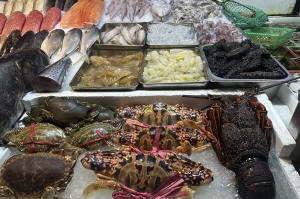China lifts a nearly 2-year ban on seafood from Japan over Fukushima
wastewater
[June 30, 2025]
BEIJING (AP) — China has reopened its market to seafood from Japan after
a nearly two-year ban over the discharge of slightly radioactive
wastewater from the tsunami-destroyed Fukushima nuclear power plant.
A notice from the customs agency said the ban had been lifted Sunday and
that imports from much of Japan would be resumed.
The ban, imposed in August 2023, was a major blow to Japan's scallop and
sea cucumber exporters. China was the biggest overseas market for
Japanese seafood. The decision to lift the ban coincides with efforts by
China and Japan to improve ties as both face economic uncertainty
because of the American tariffs imposed by President Donald Trump.
“This is a major turning point for Japan, which sees seafood as an
important source of exports,” said Agriculture, Forestry and Fisheries
Minister Shinjiro Koizumi, the son of former Prime Minister Junichiro
Koizumi.
The nuclear plant at Fukushima was heavily damaged by a deadly tsunami
that followed a huge offshore earthquake in 2011. Water still must be
pumped in to cool the radioactive fuel. The water is then stored in what
was an ever-growing complex of tanks on the property.
After years of debate, the utility won Japanese government permission to
discharge the water gradually into the sea after treating it to remove
most of the radioactive elements and diluting it with seawater. Japanese
officials said the wastewater would be safer than international
standards and have negligible environmental impact.
China disagreed and imposed a ban, saying the discharge would endanger
the fishing industry and coastal communities on its east coast.

[to top of second column] |

Seafood are displayed at a market in Beijing, Dec. 29, 2024, after
China banned seafood imports from Japan in August 2023. (AP Photo/Ng
Han Guan)
 Over months of talks, Japan agreed
to let China take samples of the water for testing. The sampling has
not found any abnormalities, the customs agency notice said
China still opposes the wastewater discharge, but based on
scientific evidence and analysis, it is allowing imports on a
conditional basis from parts of Japan that meet China's standards,
Foreign Ministry spokesperson Mao Ning said.
A ban remains in place for seafood from 10 of Japan's 47
prefectures, including Fukushima and nearby ones.
Japanese seafood exporters will have to reapply for registration in
China and all imports will have to include a health certificate, a
certificate of compliance for radioactive substance testing and a
certificate of origin, the Chinese customs agency said.
Shipments to China are expected to resume gradually, Japanese
government spokesperson Kazuhiko Aoki told reporters in Tokyo on
Monday, noting the re-registration requirement.
He said it was unclear how quickly scallop and sea cucumber
exporters would return to China, because they had sought out other
markets since the ban. But he predicted sales of sea cucumbers, a
prized delicacy in China, would recover to a certain degree.
Aoki said the Japanese government would continue to press for the
lifting of the export ban on the other 10 prefectures.
All contents © copyright 2025 Associated Press. All rights reserved |